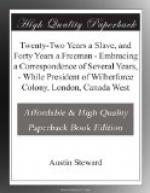Soon after the event above narrated, a law was passed in the Province, allowing each township to elect three commissioners, whose duty it should be, to transact the public business pertaining to the township. Each township should also elect one township clerk, whose business it should be, to hold and keep all moneys, books, and papers belonging to said town; with power to administer oaths, and in fact, he, with the commissioners, were to constitute a board, possessing all the power of a court, in relation to township business.
In our colony, located in the township of Bidulph, the colored people were a large majority of the inhabitants, which gave us the power to elect commissioners from our own settlement, and therefore, three black men where duly chosen, who entered on the duties of their office, while your humble servant, A. Steward, was elected township clerk, with all the responsibility of the office resting upon him and the same power given him as though he had been born in Her Britannic Majesty’s dominion, with a face as white as the driven snow. I felt the responsibility of my office, but not more deeply than I did this assurance of entire confidence, and respect shown me by my townsmen, after all the cruel persecutions I had met; after all the accusations of theft, forgery, &c., that vicious person could bring against me.
The Rev. Nathaniel Paul, with his lady, arrived at Wilberforce in the spring of 1835, to the great joy of the colonists, to find that his brother had gone the way of all the earth, and his remains quietly resting on his own premises, where his afflicted family still resided.
In the colony there was a great deal of excitement regarding the course our agent would pursue, and all waited with anxious expectancy to see him enrich the treasury with his long-promised collections.
We had agreed, on sending him forth as an agent for the colony, to give him fifty dollars per month for his services, besides bearing his expenses.
The reverend gentleman, charged, on his return to the colony, the sum specified, for four years, three months and twenty days. We spent several days in auditing his account, with increased fearful forebodings. We found his receipts to be, in the United Kingdoms of Great Britain, one thousand six hundred and eighty-three pounds, nineteen shillings; or, eight thousand and fifteen dollars, eighty cents. His expenditures amounted to one thousand four hundred and three pounds, nineteen shillings; or, seven thousand and nineteen dollars, eighty cents. Then his wages for over four years, at fifty dollars per month, left a balance against the board of several hundred dollars, which we had no funds to cancel, inasmuch as the reverend gentleman had paid us nothing of all he had collected in Europe, nor even paid a farthing toward liquidating the debts incurred for his outfit and expenses.




